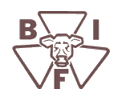Friday General Session
The Nature and Scope of Some Whole-Genome Analyses in U.S. Beef Cattle
Abstract:
The production of expected progeny differences (EPDs) from statistical analysis of pedigree and performance records is a tried and true method for characterizing the genetic merit of animals. However, response to selection on such EPDs is suboptimal because there are no EPDs for some economically relevant traits and, for those that are available, the accuracies are typically low at the ideal selection ages around puberty, especially for traits with low heritabilities, or those that can be measured in only one sex or late in life. In theory, more accurate genomic-enhanced EPDs could be obtained in target populations of selection candidates from prior knowledge of EPD associated with various chromosome fragments.
This prior knowledge is typically obtained from Bayesian analyses in a so-called training or discovery population. Three critical issues arise in relation to this process:
- First, what is the upper limit for accuracy or predictive ability using a high-density 50k genomic panel?
- Second, how is predictive ability influenced by genetic distance between the training and target population? A close distance would involve training in widely used sires for prediction in their offspring; whereas, a long distance would involve prediction in another breed or cross.
- Third, can a much smaller and cheaper subsample of no more than a few hundred markers be used without substantially eroding predictive ability?
All three of these issues are the current focus of whole-genome analyses in U.S. beef cattle based on the Illumina 50k panel. Available training resources include populations of AI bulls with published EPDs, such as the Angus and Limousin datasets developed by the University of Missouri and the multi-breed 2000 bulls project being undertaken by the U.S. Meat Animal Research Center (USMARC) at Clay Center, Neb.
The real power of genomic selection will be achieved when results can be extended beyond the basic suite of EPD traits, and for these purposes dedicated populations need to be collected with specific phenotypes. A study over several generations of F2 Nellore-Angus at Texas A&M University includes temperament and docility measures in addition to feed intake, reproductive and carcass attributes. Several other populations with individual feed intake data have been collected, including those at University of Alberta, Guelph University, University of Missouri and USMARC.
Pfizer Animal Genetics has funded projects, principally in Angus cattle, to collect data on carcass and meat attributes, including beef healthfulness and feedlot health and performance data in collective projects that have involved the National Beef Cattle Evaluation Consortium, Iowa State University, Colorado State University, University of California at Davis and Oklahoma State University.
Competitive funding through USDA-NRI has been used for projects led by New Mexico State University involving female fertility in Brangus animals, Cornell University to build ongoing and future resource populations, and Iowa State University, CalPoly San Luis Obispo and USMARC to develop web-accessible publicly available Bayesian analytical tools for genomic selection. A project led by University of California at Davis is considering the integration of DNA information into beef production systems and includes a ranch and rancher focus with comprehensive outreach component.
Collectively, these projects represent major intellectual and economic investments in beef cattle improvement through funding by Pfizer Animal Genetics, Merial, land-grant universities, USDA-ARS and USDA-NRI that will, over the next 12 months, provide some concrete answers to the three critical issues and deliver improved selection tools to the U.S. beef industry.
Click here to view proceedings.
About the speaker:
Dorian Garrick was appointed to the Jay Lush endowed Chair in Animal Breeding & Genetics at Iowa State University in August 2007 following five years at Colorado State University. He received a first class honors degree in agricultural science from Massey University in New Zealand and a doctorate from Cornell University. Since 1994, Garrick has held the A.L. Rae Chair at Massey University.
Garrick has been integrally involved in the development and implementation of national animal evaluation programs, performance recording databases and breeding schemes. He has worked in the design of experiments to detect major genes and to exploit them in breeding programs. Dorian views animal breeding in a systems context, involving the integration of knowledge and understanding of business goals, production systems, processing and marketing, in concert with quantitative and molecular genetics. Garrick has worked with a variety of genetic improvement programs, including beef cattle, dairy cattle, dual-purpose sheep, fine-wooled sheep, pigs, elk, salmon and tree breeding.
Garrick is a director of the U.S. National Beef Cattle Evaluation Consortium.
Editor’s Note: The above material is provided by and posted with permission of the Beef Improvement Federation. Please direct reprint requests to BIF via the “Contact BIF” page at www.beefimprovement.org.



